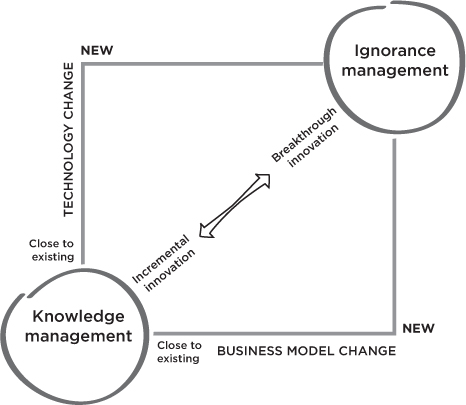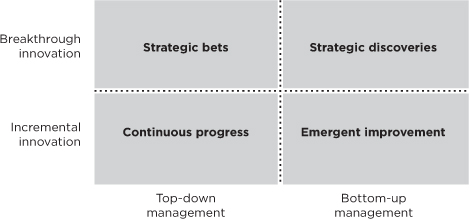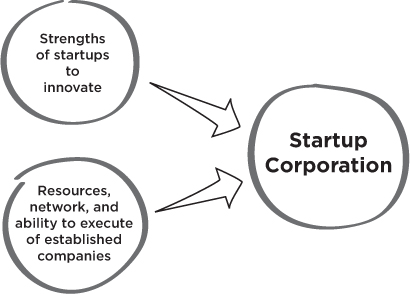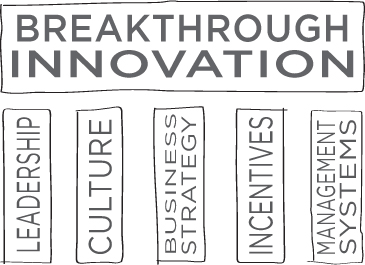
Download PDF Excerpt
Rights Information
The Innovation Paradox
Why Good Businesses Kill Breakthroughs and How They Can Change
Tony Davila (Author) | Marc Epstein (Author)
Publication date: 06/03/2014
The problem, say Tony Davila and Marc Epstein, is that the very processes and structures responsible for established companies' enduring success prevent them from developing breakthroughs. This is the innovation paradox.
Most established companies succeed through incremental innovation—taking a product they're known for and adding a feature here, cutting a cost there. It's a solid recipe for growth, but major breakthroughs are hard to achieve when everything about the way your organization is built and run is designed to reward making what already works work a little better. But incremental innovation can coexist with breakthrough thinking.
Using examples from both scrappy startups and long-term innovators such as IBM, 3M, Apple, and Google, Davila and Epstein explain how corporate culture, leadership style, strategy, incentives, and management systems can be structured to encourage breakthroughs. Then they bring it all together in a new model called the Startup Corporation, which combines the philosophy of the startup with the experience, resources, and network of an established company. Startup corporations encourage visionary thinking at all levels—instead of depending on a single Steve Jobs, they have dozens, even thousands of them.
Breakthrough innovation no longer has to be the nearly exclusive province of the new kids on the block. With Davila and Epstein's assistance, any company can develop paradigm-shifting products and services and maximize the ROI on its R&D.
Find out more about our Bulk Buyer Program
- 10-49: 20% discount
- 50-99: 35% discount
- 100-999: 38% discount
- 1000-1999: 40% discount
- 2000+ Contact Leslie Davis ( [email protected] )
The problem, say Tony Davila and Marc Epstein, is that the very processes and structures responsible for established companies' enduring success prevent them from developing breakthroughs. This is the innovation paradox.
Most established companies succeed through incremental innovation—taking a product they're known for and adding a feature here, cutting a cost there. It's a solid recipe for growth, but major breakthroughs are hard to achieve when everything about the way your organization is built and run is designed to reward making what already works work a little better. But incremental innovation can coexist with breakthrough thinking.
Using examples from both scrappy startups and long-term innovators such as IBM, 3M, Apple, and Google, Davila and Epstein explain how corporate culture, leadership style, strategy, incentives, and management systems can be structured to encourage breakthroughs. Then they bring it all together in a new model called the Startup Corporation, which combines the philosophy of the startup with the experience, resources, and network of an established company. Startup corporations encourage visionary thinking at all levels—instead of depending on a single Steve Jobs, they have dozens, even thousands of them.
Breakthrough innovation no longer has to be the nearly exclusive province of the new kids on the block. With Davila and Epstein's assistance, any company can develop paradigm-shifting products and services and maximize the ROI on its R&D.
—Soumitra Dutta, Dean, Johnson Graduate School of Management, Cornell University
“Davila and Epstein have crushed the prevailing mindset that business units, operational excellence, and traditional approaches to innovation can deliver sustained growth. Building and balancing the traditional and startup operating models is the top item for every company's growth agenda.”
—Robert Shelton, coauthor of Making Innovation Work and a World Economic Forum Innovation Champion
“Davila and Epstein solve the perennial mystery that has puzzled many corporate leaders: what are the forces inside large companies that prevent them from developing breakthrough innovations? This book provides an insightful framework for diagnosing those forces and tools for overcoming organizational inertia to implement processes that result in breakthroughs.”
—Steven C. Currall, Dean and Professor of Management, Graduate School of Management, University of California, Davis, and coauthor of Organized Innovation
“The Innovation Paradox sheds light on how large corporations can successfully innovate while creating shareholder value. It informs the reader on how different corporate cultures and management styles play a key role in being successful at different points of the innovation spectrum.”
—Laizer Kornwasser, Company Group Chairman, Valeant Pharmaceuticals
“Many organizations are structurally committed to the status quo. Davila and Epstein offer practical ideas to overcome this challenge while preserving existing success.”
—Srikant Datar, Arthur Lowes Dickinson Professor, Harvard Business School
“In boardrooms, one of the most critical discussions centers around innovation and how to leverage creativity in the marketplace—faster and better than in the past. The Innovation Paradox demonstrates how to overcome obstacles and create breakthrough innovation.”
—Blythe McGarvie, member of the board of directors of Accenture, Viacom, LKQ Corporation, and Sonoco
“Davila and Epstein have done it again. After their very successful first book (coauthored with Rob Shelton), Making Innovation Work, they introduce the insightful concept of the Startup Corporation, which combines two seemingly contradictory mindsets and skillsets: the ability of startups to create new business opportunities and the disciplined execution of large corporations to achieve profitable growth. This combination is required if the corporation is to develop the capability for continuously generating innovations. Davila and Epstein take the reader through a framework for creating the Startup Corporation that addresses both tangible factors such as strategy, systems, and incentives and intangible ones such as organizational culture and leadership style. The book is practical and engaging and provides numerous tools for creating an innovative organization.”
—S. Ramakrishna Velamuri, Professor of Entrepreneurship and Department Chair (Strategy and Entrepreneurship), China Europe International Business School
“Written by world-class authorities on innovation, product development, and startup life cycles, this book is a must-read for any entrepreneur. As CEO of a venture-backed startup, I've learned an immense amount from it.”
—Sunil Rajaraman, CEO, Scripted.com
“Breakthrough innovation is no longer a mystery—Davila and Epstein have broken the code. Now even the most established organization can come up with disruptive products and services.”
—Klaus Peter Müller, Principal, Roland Berger Strategy Consultants GmbH, Germany
“Davila and Epstein have done impressive research to uncover the hidden impediments to innovation present in most established organizations. Their recommendations for overcoming those impediments while preserving existing success are well thought out and very practical.”
—Gloria Perrier-Châtelain, Senior Global Director, Digital Marketing Strategy, and Partner, SAP, France
“For the first time, Davila and Epstein offer a solution to the ‘startup envy' experienced by so many organizations. They show that, with the right adjustments, innovations can flow from high-rises as well as from garages.”
—Bence Andras, Partner, Proventus AG, Switzerland
1. What is the Innovation Paradox?
1.1 Incremental and Breakthrough Innovation
1.2 Top-Down and Bottom-Up Innovation
1.3 Managing for Strategic Discoveries
1.4 The Startup Corporation
1.5 The Truth About the Innovation Paradox
2. The Benefits and Limits of the Business Unit
2.1 The Benefits of Business Units
2.2 The Limits of Business Units
2.3 Business Units, Functional Structure, and Breakthrough Innovation
3. The Success of Startups
3.1 Copy and Combine from Others
3.2 Learn as Quickly and as Cheaply as Possible
3.3 Manage Risk Effectively
3.4 Govern Transparently
3.5 Execute
3.6 Learning From the Activities of Startup Innovation
3.7 Learning from the Creation of Science
4. The Startup Corporation: The New Kid on the Block
4.1 Beyond the Success of Startups
4.2 Adopting the Strengths of Startups
4.3 Stage One: Inspire
4.4 Stage Two: Attract
4.5 Stage Three: Combine
4.6 Stage Four: Learn
4.7 Stage Five: Leverage
4.8 Stage Six: Integrate
5. Implementing the Startup Corporation
5.1 Solutions for Inspiring
5.2 Solutions for Attracting
5.3 Solutions for Combining
5.4 Solutions for Learning
5.5 Solutions for Leveraging
5.6 Solutions for Integrating
6. Overcoming the Innovation Paradox: Designing the Startup Corporation
6.1 Managing Breakthrough Innovation Projects
6.2 Inspiring the Startup Corporation
6.3 Attracting Ideas into the Startup Corporation
6.4 Combining the Pieces of the Startup Corporation
6.5 Learning for Strategic Discoveries
6.6 Leveraging Strategic Discoveries
6.7 Integrating Strategic Discoveries
7. Innovative Cultures
7.1 Changing the Culture of an Organization
7.2 Employee Abilities
7.3 Supporting Innovation Activities
7.4 Goals and Evaluation
7.5. Role Models and Structures
7.6 Resources, Culture, and Innovation
8. Leading for Breakthrough Innovation
8.1 The Innovation Strategist
8.2 The Innovation Sponsor
8.3 The Innovation Architect
8.4 The Innovation Evangelist
8.5 Personal Characteristics of Innovative leaders
9. Hard Foundations: Strategy, Incentives, and Management Systems
9.1 Strategies for Breakthrough Innovation
9.2 Incentives for Breakthrough innovation
9.3 Management Systems for Breakthrough innovation
10. Wrapping up
About the Authors
Index
1. What Is the Innovation Paradox?
NOKIA WAS A FINE-TUNED MACHINE when it came to grabbing the latest trends in mobile phone use and translating them into robust, profitable designs. Its scouters mixed up with young urban trendsetters, executives, and families, almost to the point where they understood their customers better than they understood themselves. Techniques ranging from in-depth ethnographies to early prototyping helped the company keep its healthy lead in mobile communication. For instance, the discovery that people in countries such as Morocco and Ghana would share phone conversations led Nokia to develop phones with more powerful speakers, making it easier for more people to participate in conversations.1 Incremental innovations—gradual, regular improvements to existing products and services—allowed Nokia to maintain and extend their lead in the market as they knew it. What could possibly go wrong?
Nokia’s market lead fell apart when the smart phone became the mobile device of choice. Since the company was so successful in the market for traditional mobile phones, when the market shifted away from their flagship products, Nokia was left with a nearly perfect organization innovating for a market whose relevance quickly eroded. Not only did Nokia lose its venerable market position, but it also lost any meaningful chance of making a dent in the smart phone market, allowing companies like Apple and Samsung to establish themselves.
Another example of creative destruction caused by breakthrough innovation—the kind of innovation that disrupts old markets and creates new ones—in the mobile communication industry is the ups and downs experienced by RIM (Research in Motion), the company behind the Blackberry. Blackberry was one of the early winners of the smart phone revolution, with a 22 percent market share in 2009. Executives praised its design and its security. Businessweek ranked it as the eighth most innovative company in the world. But by 2013, users were leaving Blackberry for new devices with more appealing features, and RIM’s market share whittled down to 2.7 percent.2 RIM kept executing on a strategy that had proven to be very successful, but one that had become obsolete in the fast-changing market.
The innovation paradox occurs when the aggressive pursuit of operational excellence and incremental innovation crowds out the possibility of creating breakthrough innovations. Its opposite is also often true—companies with a focus on developing breakthroughs can lose their starting-line position to companies that simply execute better. What happened to Nokia with the advent of the smart phone, and RIM with the growing popularity of touch screens and other smart phone features, are merely two of many examples of companies that have fallen victim to the innovation paradox.
Operational excellence and incremental innovation feed success within existing business models, but they can feed failure when it comes to creating new ones. The financial performance of incumbents frequently deteriorates quickly after an industry goes through a structural change. As Nokia and RIM discovered, by the time the structural change erodes the financial performance of incumbents, it is often too late for the leaders of the old market to catch up. Incremental innovation delivers results as long as the industry structure remains stable, yet it can fail miserably when breakthroughs redefine an industry.
Disruptive technologies and innovations cause drastic market changes.3 The interesting thing is that incumbents often see them coming but then disregard them, to focus on incremental innovation. Nokia, for example, actually had a prototype of a smart phone. Yet their existing customers—the ones the company already knew and understood—were not asking for it. But if you simply ask people what they want, oftentimes the answer will be more of the same; consumers will often extrapolate from whatever is available today. Nokia was extremely successful with the phones they were selling, so why should they introduce a product their customers didn’t even know they wanted? Hence, Nokia kept making improvements on models their customers liked. All the while a new market was about to form, taking with it many of those customers.4
Established companies can choose to disrupt markets through breakthrough innovation, or they can wait and hope: hope that their industries will not radically change, and that incremental innovation will keep on driving success. They can hope that the change will not be too abrupt and that they will be able to catch up; they can hope the change will only be a passing fad; they can lobby to stop the change; or they can be out in front and create the change.5
Operational excellence and incremental innovation succeed as long as an industry follows the predicted path.
All industries experience breakthrough changes that make existing strategies obsolete. At these points, what made companies great can become their largest liability.
INCREMENTAL AND BREAKTHROUGH INNOVATION
Innovation is often mistakenly seen as a singular concept. Either your company is innovative, or it is not; either it’s in your culture, or it’s not. But innovation can best be understood as a range of types and intensities. At the ends of the spectrum are two markedly different phenomena—incremental innovation and breakthrough innovation (figure 1.1). Both have the goal of moving creativity to market, but similarities end soon after that.
Innovation is not a single concept. Failing to capture the differences in types of innovation throughout the management process leads to problems and frustrations.
Incremental innovation is about improvements, while breakthrough innovation is about discovery. Managers looking for the single best way to handle innovation are set to fail. As they search for the golden solution, they become frustrated when their innovation model fails to deliver the expected results. They conclude that their company does not have the culture and resources to achieve the feats they see in other organizations.
Incremental and breakthrough innovation (and all the shades in between) can be visualized as coming from a range of technology and business models, some existing and others yet to be imagined (see figure 1.2).7 Innovation works best when technological and business model dimensions are brought together. For example, the leadership of fashion firms often pair a creative mind—to come up with concepts that people had never considered—with a business mind—to bring those concepts to the market. Desigual, a fast-growing fashion firm, joined the creativity of Thomas Meyer with the business acumen of Manel Adell. Legendary design firms such as Christian Dior, Ralph Lauren, Prada, and Gucci also combine the separate talents of designers and businesspeople.8
Figure 1.1. Types of innovation
Figure 1.2. The innovation matrix6
Managing incremental innovation is about managing knowledge. Incremental innovation moves the current strategy forward. For instance, when Honda designs its new Odyssey, it isn’t reinventing the automobile. Instead, a new version of an older model likely includes a nice set of novelties. Its safety features are better, its technology makes driving easier, and its entertainment capabilities are enhanced, but most of the parameters that define the car are unchanged.
In contrast, managing breakthrough innovation is about managing ignorance and uncertainties. For instance, consider the questions surrounding the driverless car: Which technology works best? How will people use it? How will it be commercialized? Will it coexist with or replace traditional cars? Will we need garages? How will traffic be regulated on driverless roads? As innovation efforts move away from existing products and services toward new technologies and new business models, uncertainty increases, risk goes up, and knowledge is sparser.
Breakthrough innovation deals with much higher levels of uncertainty and risk, and lower levels of knowledge. Thus, it needs to be managed differently from incremental innovation.
The two extremes of innovation are so different that they can’t be managed the same way, and how you manage determines what you get.9 If what begins as breakthrough innovation is managed as incremental, more likely than not it will become an incremental innovation. Sure, luck plays a substantial role, and a company may be lucky and get a breakthrough from an incremental innovation process. But putting more and more money into traditional incremental innovation processes will probably not significantly increase the already small odds of getting a breakthrough. Table 1.1 describes the main differences between incremental and breakthrough innovation.
Incremental Innovation
Most companies are good at developing innovations that build upon and advance the current strategy—innovations that fit within existing technologies and business models. Such developments help create operational excellence. A large percentage of investments go to feed this sort of innovation, the kind that keeps an organization in the game and gives it an edge over competitors. It is a hugely important type of innovation. Moreover, little steps, if they are taken faster than the pace of competitors, can put a company in the leadership position.
Winning in established markets requires executing faster through incremental innovation cycles. Even in maturing markets, the end-winner is the company able to better execute. Fast seconds—companies that come from behind to dominate markets—often end up at the top of the game.10 Apple largely created the market for smart phones and tablets through the iPhoneiPad revolution, but Google and Samsung have been claiming territory with relentless efforts to bring incremental concepts to market. Pioneers such as Sixdegrees and MySpace explored social media early on, only to see Facebook take the lion’s share of the market, LinkedIn succeed in professional networks, and Twitter take the short communication space.
Table 1.1. comparing incremental and breakthrough innovation

Incremental innovation operates with relatively low amounts of uncertainty, large amounts of knowledge, and often large amounts of resources as well. It benefits from structured processes, because processes are good at managing knowledge and resources efficiently. For example, Logitech has dominated the computer peripheral market for more than a decade now. Every year, they come up with mice, keyboards, and web cams that are better than earlier versions. When Logitech goes into designing these new products, it already knows what the majority of these products will look like. It knows when the new products have to be on the market, the technologies that will go into them, their price points, their features, and a quite accurate development budget estimate. Of course, some uncertainties exist—like whether the new design will appeal to the consumer, or the new features will be better than those of competitors. But these uncertainties pale in comparison to the uncertainties of building industries around “not-yet” markets, like space tourism, nanorobots, or an ageless society.
Incremental innovation is extremely important for sustaining competitive advantage in current markets, and its inspiration benefits mostly from in-depth customer knowledge. Back in early 2000, Logitech, the leader in computer peripherals, had no presence in the keyboard market. One of its marketing department studies asked consumers to name the most important keyboard manufacturers, and even though Logitech had never made a keyboard, it came out as number three on the survey. A lot of companies would discard this information, or discount it as showing how ignorant consumers are—after all, Logitech knew that it had never sold a keyboard. Instead, the company interpreted it as a clear message to get into the market. In the minds of consumers, Logitech built and designed great mice, so they should also make great keyboards. Since keyboards use existing technology and were manufactured and distributed through the same channels as mice, Logitech’s innovation was far from break-through. Yet it became a large and profitable business, and Logitech eventually ended up grabbing the number-one position.
Incremental innovation also benefits from going beyond customer needs into customer motivations. Design thinking and human-centered design effectively use careful observation and patient efforts to determine what people need and why people behave the way they do. They help understand that products not only fulfill a function but also have social and emotional meanings.
Incremental innovation operates with relatively low levels of uncertainty, benefits from established processes, and is extremely important for sustaining competitive advantage in current markets.
Overall, incremental innovation is a fundamental aspect of winning—it can result in rapid improvements for customers as well as for the organization, and it can keep company morale up by maintaining momentum. In fact, incremental innovation is central for staying competitive in current markets, and for defending new developments. While incremental innovation has barriers to achievement, the other end of the spectrum of intensity—breakthrough innovation—is a whole different beast altogether.
Breakthrough Innovation
In 1926, Henry Ford designed an airplane for the mass market—his idea being that everybody would fly an airplane much like they drove a car. The idea of personal planes is still appealing, and various research groups today are working to make this idea a reality. Should these groups successfully design the product and the business model to make it available to a large number of consumers, a lot of the infrastructure that we take for granted will be questioned, and additional infrastructure will need to be created. A world in which individuals pilot planes with the regularity that people now drive cars would certainly be a new paradigm, and would require a whole slew of support systems and structures.
Breakthrough innovations redefine paradigms and offer new ways to look at the world. Breakthroughs are often swift and spectacular, but they can also evolve over longer periods of time.
Breakthrough innovation can shift existing paradigms. It is much riskier than incremental innovation, and the quest for it often fails, but it holds huge potential for growth. When breakthrough innovation succeeds, it creates new markets and redefines industries; incumbents often lose their dominant positions in favor of the mavericks who took the risk to change their industries and won. Its effects can be devastating to companies that failed to gauge its implications on their customer base, and it can truly disrupt the status quo.
The most visible breakthrough innovations act quickly and revolutionize industries in very short periods of time. Often they create and leverage new technologies that rapidly make existing ones obsolete. For example, the iPod and the business model around it all but banished other portable music devices, while smart phones put companies focused on more traditional mobile devices in a difficult position. By the time the performance of disruptive technologies catches up with the incumbents’ technologies, the incumbents are often hard pressed to develop a way to compete in the new market.
In other cases, breakthrough innovations are crafted over several years and take longer to fully transform industries. The international fashion company Zara is an example. In a market traditionally dependent on seasons and advertising in traditional media, trial and error in Zara’s early years helped them shape a robust, disruptive, and winning business model. Whereas fashion was once an almost exclusively seasonal event, it is now a constant flow. Design cycles are measured in weeks rather than months; products that are sold out are not replenished; and print advertising is not needed to bring people into the shop. Zara has challenged deeply ingrained assumptions about how people shop for clothes, and how companies should serve them—and it has paid off. Breakthrough innovation is about questioning our values and beliefs, our mental models of how industries work, and our assumptions.
Breakthrough innovation is not only about managing uncertainty and learning from successes; it is also about learning from failures. The CEO of an innovative engineering company with stellar performance at one time argued, “if we want to grow beyond our existing business model, we need to learn to defend the solutions that we conquered. We are very good at attacking, but we are not able to defend our positions.” The company was set up for groundbreaking innovations, but the company failed to manage the incremental steps necessary to maintain a position once it had taken it. Breakthrough innovation needs to be followed by a constant flow of high-quality incremental innovation. It is great to break new ground, but the value of your innovation can quickly slip away to competitors if you can’t defend it.
A lot of the frustration surrounding innovation efforts in companies is the result of hoping to get breakthrough ideas when structures and processes are largely set up for incremental innovation.
Incremental innovation is about employing creativity within existing strategies and industry structures. Breakthrough innovation is about employing creativity to come up with new strategies, new industries, and new societies.
The last decade has seen different emphases on open and closed innovation. Some companies still believe in a closed model, but most organizations have embraced a more open model, in which internal resources and external networks are combined to optimize the innovation process. Open models are even more important for breakthrough innovations. For example, the model used in university research has always emphasized collaboration and the open exchange of ideas. Breakthrough innovations coming out of universities are the culmination of lots of small steps from different research groups across the globe. An old adage says, “Visionaries see more because they stand on the shoulders of giants,” and open access to knowledge builds these giants. In that same spirit, companies like IBM, Nokia, and Sony have made their patents related to improving the environment available for free on the Eco-Patent Commons platform. People can use this intellectual property to come up with environmentally friendly innovations. Other initiatives, such as Green Xchange, intend to create communities for people to exchange ideas, knowledge, and patents concerning environmental innovations.11 But the idea of open innovation isn’t only about giving things away, or making things freely available—it’s also about creating networks that work together to address bigger opportunities.
TOP-DOWN AND BOTTOM-UP INNOVATION
Another difference in the features of incremental and breakthrough innovation is the tension between top-down and bottomup innovation. If you want breakthrough innovation but manage it as incremental, odds are a big breakthrough won’t happen. Similarly, if you want bottom-up innovation but the company is managed using a top-down approach, people will not contribute. Managers are often surprised that their employees fail to come up with ideas. What they don’t realize is that their day-to-day message is for people to execute ideas originating at the top. Xerox’s PARC research center has become a classic illustration of headquarters missing out on opportunities to capitalize on ideas generated at the bottom of the organization. The company set up the right environment—smart people in a stimulating environment with resources to explore radical ideas. Yet it failed to channel those ideas into new Xerox businesses. In fact, the ideas ended up creating significant value outside Xerox.
Innovation coming from the top requires a different management approach than bottom-up innovation. The latter requires not only having a rich environment but also having mechanisms for nurturing and moving ideas within the organization.
Managing innovation top-down is a different process than if innovation bubbles up from the bottom of the organization and its networks. The Apple-Google contrast illustrates this distinction. Apple’s success was largely dependent on the genius of Steve Jobs, who had the vision and courage to take risks and to steer the company into unexplored products and markets. Apple was designed to implement this top-down vision. A functional structure implemented the ideas coming from top management. The full perspective on new ventures was limited to a handful of people; different sections of the company worked on pieces of these ventures without necessarily understanding the whole. The success of this approach to breakthrough innovation hinges on the visionary leader being right about the radically different future. Of course, the vision gets embedded into the company culture, and Apple’s culture reflected Jobs’s passion for products ahead of financial performance. Actually, financials were a result of the obsession for great products.12
Google’s breakthrough innovation model, on the other hand, is grounded on letting ideas bubble up. The company encourages employees to toy with new ideas and then gambles on those that appear to be the most promising. It relies on letting inspiration flow from the organization.13 The company bets on attracting the best talent and follows up by giving them the freedom and resources necessary to explore and flourish. Jeff Bezos, Amazon.com’s founder and CEO, has referred to the importance of urging people throughout the company to innovate: “I encourage our employees to go down blind alleys and experiment. If we can get processes decentralized so that we can do a lot of experiments without it being very costly, we’ll get a lot more innovation.”14
A bottom-up model of innovation is hardly compatible with a company in which top management sees the organization as a vehicle to implement its vision, and a company with a strong top-down orientation is unlikely to get breakthrough ideas rising from the bottom. The kind of innovation your organization develops has much to do with how your organization is oriented and managed.
MANAGING FOR STRATEGIC DISCOVERIES
A global company in the data management industry designed a tournament challenging employees to identify new growth platforms beyond existing businesses. The objective was to tap into the collective creativity of employees around the world to generate breakthrough innovations. The tournament was set up so that early rounds happened within established business units. Each business unit then selected the projects that made it to the final round at headquarters.
The resulting ideas were great, and top management was more than happy to provide further funding to most of them. But they still weren’t really what management was looking for. Each and every idea that employees came up with over the course of the tournament was incremental. Each built on the existing strategy of the business unit, targeted the same customers, and fit squarely into how the structure of the industry was perceived at the company. There was not a radical disruption in the bunch, and top management lost most of its faith in the possibility of first-rate ideas originating with employees.
But the outcome was fully predictable. The way the tournament was structured—forming teams within business units, and having business units be the first judges—reinforced the kind of incremental innovation that this established organization had grown to master. Not surprisingly, when the business units chose the best ideas, each one championed concepts that reinforced their existing strategies—the sort of incremental innovation that best supports execution.
Managing as if there were only one single model of innovation is in a way self-fulfilling—it tends to lead to a single kind of innovation. The phrase “How you innovate determines what you innovate” encapsulates this idea.15 The innovation processes an organization has in place will shape what that organization can do, and the intersections of innovation types and management approaches lead to four distinct models for managing innovation, as summarized in figure 1.3.16
Existing concepts in innovation management provide a limited perspective on these four innovation models. The exploration-exploitation dichotomy does a great job of describing the incremental-radical dimension. Exploration is about discovering, while exploitation is about utilizing incremental ideas to move businesses forward. Exploitation can either be pushed top-down through demanding targets that force people to move their business model forward, or be opened to bottom-up contributions that stimulate and develop ideas. Exploration can pursue radical ideas from top management or encourage the ingenuity of people throughout the company. The concept of ambidextrous organizations highlights the need for large, established players to combine incremental and breakthrough innovation. It also reinforces the tension between managing incremental and breakthrough innovation: the incremental-radical paradox. But it does not reflect the top-down versus bottom-up paradox—the fact that organizations managed in a top-down manner will struggle to find innovative ideas percolating up from the bottom.
Figure 1.3. Management models for innovation
Continuous Progress
The type of innovation that many established organizations already excel at developing is continuous progress—innovation that improves on current technology and business models. A range of management tools has been designed over the last 150 years to deliver on top-down incremental innovation.
Continuous progress starts with top management setting more demanding objectives for each upcoming period. Top management often uses strategic planning to synthesize ideas into specific objectives for a designated time. These objectives incorporate improvement goals, investment decisions, and new management processes and structures. Difficult but achievable targets, operational budgets, nonfinancial performance measures, and investment budgets are some of the tools used for continuous progress.17 These objectives force people to work harder, as well as be creative in finding new ways to meet their goals. As long as the competitive landscape is stable without extreme changes that threaten the status quo, this type of innovation is paramount to success.
Continuous progress—top-down incremental innovation—is paramount to gain and maintain competitive advantage in stable markets. Strategic planning and demanding targets force people to innovate to meet goals.
Emergent Improvements
Whereas continuous progress induces people to be creative to meet their goals, emergent improvements encourage people from the bottom up to be inventive. This model for innovation makes space for people to suggest incremental developments to current products and services. Creativity workshops, brainstorming sessions, idea competitions, storytelling, and idea tournaments are all efforts to leverage the creativity of people in the larger company. They challenge the idea that top managers are the only creative employees. Yet such bottom-up innovation activities require proper management tools and structures to avoid losing potentially valuable ideas.
Emergent improvements are the result of structured processes to stimulate and capture ideas from the bottom of the organization.
The customer is at the center of emergent improvements. In fact, the most important part of incremental product and service innovation is a thorough understanding of the customer. Having a feel for customers, processes, technologies, and industries helps organizations execute better than their competitors. Such understanding is easier to achieve in close contact; customer research techniques in which people “live” with customers—not unlike the way ethnographers do to better understand societies—are often the first steps. Emergent improvements also benefit from tapping networks outside the company and leveraging their ideas. Part of the challenge, then, is to motivate people, stimulate their curiosity, and give them a channel for bringing their ideas to decision makers.
Strategic Bets
Breakthrough innovation in established companies is often driven from top management choosing a risky but potentially high-return strategy to implement across an organization. Its success depends on both the insight of its creator’s vision—whether the leader is betting on the right future scenario to play out—and a company’s ability to execute on that vision. Apple with Steve Jobs at the helm exemplifies an organization capable of bringing a breakthrough innovation to market.
Strategic bets are leader-centric and execution driven.18 The leaders who make them often have traits of genius. They are the Hitchcocks and Coppolas of business, so to speak: people who envision the future and work with many other creative people to make it happen. When successful, they transform companies, industries, and sometimes even society. However, the strategic bet innovation model hinges on the quality of a leader’s vision and the ability of an organization to execute on it. If the leader’s vision is off, the organization executes into a brick wall. Successful startups are built on the vision of their founders, yet their success or failure depends on whether they perform better than anybody else. Winners in the startup world are not necessarily the ones with the best ideas; they are the ones who are best at adapting and executing.
Strategic bets are breakthroughs that come from the top of an organization. They depend on people at the top having the right vision and an organization ready to execute on this vision.
Strategic bets are common for companies hit by a structural change in their industry. As companies see their financial performance sinking, they go after strategic bets as the life raft that might save them. While they can look appealing when a supposedly tried-and-true strategy starts to falter, strategic bets in turnaround situations add the urgency to perform to the uncertainty of breakthrough innovation. The outcome is often failure.
Strategic Discoveries
Not every organization has a visionary leader with a clear vision of the future, and no visionary leader is right every time. Strategic discoveries—the focus of this book—are breakthroughs that result from harnessing the insights of many people throughout an organization and its networks. Strategic discoveries are about combining the talent, inspiration, and vision of people with different expertise: the hidden geniuses. They bring together many visionaries to create a breakthrough masterpiece.
Strategic discoveries are breakthrough innovations that result from bringing together the genius of many people throughout an organization and its networks.
Strategic discoveries are about trusting the people in your organization rather than betting on the inspiration of a few at the top. Smart people, especially gifted ones within a field, are far more likely to be found among employees and their external networks as numbers grow. It is simply the law of large numbers—the chance of finding a person with talent and a wonderful idea is much greater in a group of 10,000 people than it is in a group of 20. This approach leverages not only the creativity within a company but also the creativity in its network. (For a comparison of approaches to innovation management, see table 1.2.)
Table 1.2. comparing innovation management approaches
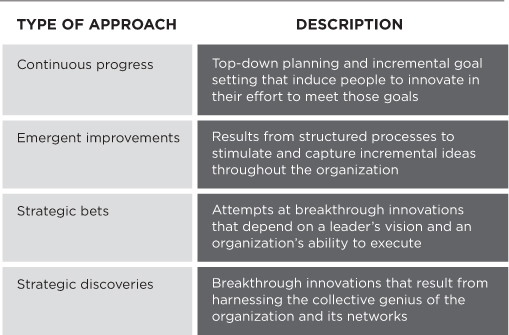
Strategic discoveries require a unique combination of organizational skills. Leaders at the helm of the company must create a trusting culture in which people are willing to take risks, and to do so without fear of making mistakes. Employees also need to learn to cope with not knowing the destiny of the company (leaders are supposed to know where the company is going!). But when you trust your people and believe in their ability to discover new strategies and business models, you relinquish some control. While the CEO still ultimately directs the evolution of current strategy, she does not necessarily know where future radical growth opportunities will come from. The CEO is not the traditional captain who knows where the ship is going better than anybody else. She knows what the next port will be, but she lets the crew identify the following one. And she allows them to chart the currents as they are, not as she would like them to be. Her job then becomes more one of facilitating the process of discovery than of pointing out the way.
Figure 1.4. The Startup Corporation
THE STARTUP CORPORATION
Whether an organization has 30 or 30,000 employees, going after strategic discoveries—bottom-up breakthrough innovation—requires a management approach that brings together the diverse resources available to an established company and the ingenuity of startup companies. The Startup Corporation is a set of management tools inspired by the way startup ecosystems are designed for exploration that allows established organizations to leverage their resources. In other words, the Startup Corporation emphasizes the strengths of startups when it comes to developing breakthroughs, but spotlights the strengths of established organizations when it comes to scaling and execution (see figure 1.4).
The characteristics of the Startup Corporation give it certain distinct advantages in avoiding the pitfalls of the innovation paradox. First, whereas companies like Nokia and RIM have seen their markets vanish with the advent of new ones, the Startup Corporation adapts management to the needs of breakthrough innovation. For instance, it devotes a portion of time, energy, and resources to exploring not-yet markets with the gusto of a startup, while still allowing the larger organization to focus on the incremental innovations that made and continue to make it a success.
The Startup Corporation provides the organizational tools to manage strategic discoveries—breakthrough innovations resulting from the combination of the insights of people throughout an organization and its networks.
On the opposite side of the coin, once the Startup Corporation begins to close in on a viable product or service, it can leverage the parent company’s resources, networks, and ability to execute. Figure 1.5 illustrates the activities of strategic discoveries that established companies need to manage in utilizing the Startup Corporation. These activities are comparable to the ones startups engage in on the way from idea to market, but they also take into account the access to resources that is unique to established companies. (While we present these activities in sequence, they go back and forth and often happen simultaneously.)
Figure 1.5. Managing strategic discoveries with the Startup Corporation
What good is it if you excel at inspiring people to have fresh ideas but fail to ultimately move those ideas to market in a meaningful way? Managing breakthrough innovation requires the Startup Corporation to handle each of the different activities of strategic discoveries: inspire, attract, combine, learn, leverage, and integrate.
The first activity—inspire—is about creating rich environments that stimulate people to come up with new ideas. Unlike top-down models that bet on the vision of a few, the Startup Corporation survives on the creative input of its members and their networks.
The Startup Corporation values the networks of all people in the organization. The attract activity highlights the openness that breakthrough innovation requires by fostering productive relationships among mutually beneficial partners. And though the lone tinkerer in a garage still yields the occasional breakthrough, some of the best are the result of a cross-pollination of organizations and industries. The combine activity reflects the complexity of breakthrough innovation by bringing together seemingly disparate ideas to create new solutions.
Breakthrough innovation is about experimenting. It is about determining what works and what doesn’t, and uncovering which assumptions are right, and which are wrong. The learn activity revolves around processes of discovery and experimentation that are central to breakthrough innovation.
The inherent advantage a Startup Corporation has as part of a larger organization is its ability to leverage that organization’s resources. Rather than needing to search for specific knowledge, networks, or support activities, the Startup Corporation has the backing (and resources) of its parent company. The final activity—integrate—is transitioning to the execution mentality that has made the larger organization successful, where operational excellence and incremental innovation will determine long-term success.
Since the Startup Corporation is situated within an established company, its success largely depends on how it is set up, as well as on the support it receives from the parent company. Without strong foundations (see figure 1.6), the most advanced efforts for breakthrough innovation stand a great chance of failing.
Even with all of the foundations in place, getting a breakthrough innovation to market in a meaningful way—and turning that breakthrough into anything more than a passing fad—requires the ability to execute and the ability to innovate incrementally.
Figure 1.6. Designing for breakthrough innovation
THE TRUTH ABOUT THE INNOVATION PARADOX
After its big coffee-by-the-cup breakthrough, Nespresso has kept its premium position in the coffee market through a constant flow of incremental innovations to its products and its business model. Facebook built on top of previous breakthrough innovations to create the most successful social network. Yet Face-book’s continued financial success depends on a steady stream of innovations—most of them incremental—to monetize the social interactions that happen through the network.
While a strong offense often revolves around breakthroughs, defense is about incremental innovation, and established companies know how to manage it. Companies need to be good at operational excellence and incremental innovation, because without them, survival is at stake. Every year, companies need to incrementally push the boundaries of today’s technologies and business models; they must come up with new products, reduce their costs, improve their processes, know their customers better, and gain that incremental margin and growth that gives them a lead over competitors—or at least keeps them in the game.
In stable industries, companies that excel at incremental innovation accumulate a significant lead over competitors. For example, Toyota’s rise to leadership in the car industry is grounded on its ability to follow up breakthroughs in managing manufacturing and hybrid technology with continual incremental innovations better than anybody else. Similarly, Southwest Airlines’ success lies in consistently improving upon a business model that it invented more than thirty years ago. However, concentrating on the incremental also creates a number of challenges. If incremental innovation is considered the norm, ideas with breakthrough potential may become a rarity. When new ideas do surface, a narrow focus on enhancing current strategy can contribute to an organization’s failure to capitalize on those opportunities. Companies simply get stuck in their old ways, while markets shift and form around them.
The innovation paradox is sticky, and an established organization or leader may be tempted to hold on to what is working and forgo the costly risks that can produce breakthrough innovations. But incremental innovation isn’t and can’t be everything. Markets can change drastically—and even disappear. The truth is, both incremental innovation and breakthrough innovation are immensely important in their own ways. For an organization to thrive in the long run, it needs to be able to capitalize on breakthrough innovations when they occur while continuing to innovate incrementally and build competitive advantage every day.
Breakthrough innovation, when successful, requires a constant stream of incremental innovation to maintain the original lead.
QUESTIONS FOR ACTION
• What potential changes in the industry may make my organization’s strategy obsolete?
• What is the potential impact of emerging trends on my organization’s strategy?
• Can my organization lead big changes in the industry?
• Can my organization create new markets?
• Is my organization getting the right amount of innovation it needs for the short and long term?
• Is my organization leading or lagging behind competitors in incremental innovation?
• Is my organization leading or lagging behind competitors in breakthrough innovation?
INTERNAL PUSH FOR INNOVATION
• What have been my organization’s ingredients for success?
• What is my organization doing to improve its innovation performance?
• What type of innovation does my organization support best?
• In my organization, what is leadership’s position toward the various types of innovation?
MANAGEMENT OF INNOVATION
• How does my organization manage strategic discoveries?
• How does my organization manage strategic bets?
• How does my organization manage emergent improvements?
• How does my organization manage continuous progress?
• How can my organization improve these different processes?









